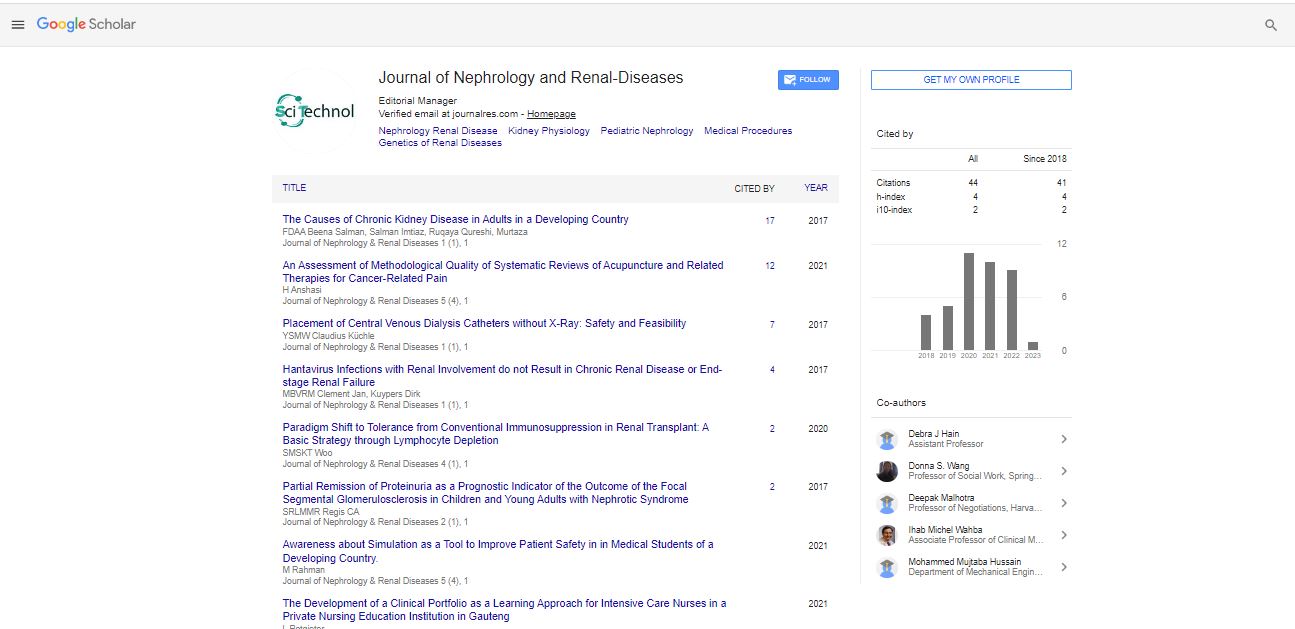Perspective, J Nephrol Ren Dis Vol: 7 Issue: 1
Diabetic Nephropathy: Understanding the Pathophysiology, Diagnosis, and Management of Renal Complications in Diabetes Mellitus
Hasan Turkez*
Department of Medical Biology, Atatürk University, Erzurum 25240, Turkey
*Corresponding Author: Hasan Turkez
Department of Medical Biology, Atatürk University, Erzurum 25240, Turkey
E-mail: Hasan.zhang@scilifelab.se
Received date: 20 February, 2023, Manuscript No. JNRD-23-96398;
Editor assigned date: 22 February, 2023, PreQC No. JNRD-23-96398 (PQ);
Reviewed date: 09 March, 2023, QC No. JNRD-23-96398;
Revised date: 16 March, 2023, Manuscript No. JNRD-23-96398 (R);
Published date: 23 March, 2023, DOI: 10.4172/2576-3962.1000021
Citation: Turkez H (2023) Diabetic Nephropathy: Understanding the Pathophysiology, Diagnosis, and Management of Renal Complications in Diabetes Mellitus. J Nephrol Ren Dis 7:1.
Description
Diabetic nephropathy is a significant complication of diabetes mellitus, characterized by progressive kidney damage and dysfunction. It is a leading cause of End-Stage Renal Disease (ESRD) worldwide, posing a significant burden on the healthcare system and affecting the quality of life of affected individuals. Understanding the pathophysiology, early diagnosis, and management strategies of diabetic nephropathy is critical in order to prevent or delay the progression of this devastating condition. It regulating blood pressure, and producing hormones that help to produce red blood cells and maintain bone health. Nephropathy can occur due to various causes and can result in impaired kidney function or even kidney failure if left untreated.
Pathophysiology of diabetic nephropathy
Diabetic nephropathy is a complex condition that results from the interplay of various pathophysiological mechanisms. Hyperglycemia, oxidative stress, inflammation, and genetic predisposition are among the key factors implicated in the development and progression of diabetic nephropathy. Hyperglycemia, a hallmark of diabetes mellitus, leads to the activation of multiple pathways, including the polyol pathway, Advanced Glycation End product (AGE) formation, and Protein Kinase C (PKC) activation, which contribute to the pathogenesis of diabetic nephropathy. Oxidative stress, resulting from an imbalance between Reactive Oxygen Species (ROS) production and antioxidant defense, plays an important role in the development of renal damage in diabetes. Inflammation also contributes to the progression of diabetic nephropathy, with various cytokines, chemokines, and immune cells involved in the inflammatory process. Additionally, genetic factors, such as polymorphisms in genes related to the Renin-Angiotensin-Aldosterone System (RAAS), have been associated with an increased risk of developing diabetic nephropathy.
Diagnosis of diabetic nephropathy
Early diagnosis of diabetic nephropathy is crucial for timely intervention and prevention of disease progression. Regular monitoring of renal function, including measurement of urinary albumin excretion and estimated Glomerular Filtration Rate (eGFR), is recommended in individuals with diabetes. Persistent albuminuria, defined as urinary Albumin Excretion Rate (AER) ≥ 30 mg/24 hours, is considered a hallmark of diabetic nephropathy. In addition, eGFR, which reflects renal function, should be assessed periodically to detect any decline in renal function. Other diagnostic tests, such as renal imaging (e.g., ultrasound, magnetic resonance imaging) and renal biopsy, may be performed in specific cases to assess the severity and extent of renal damage.
Management of diabetic nephropathy
The management of diabetic nephropathy involves multifaceted approaches targeting glycemic control, blood pressure management, and the use of specific pharmacological therapies. Achieving optimal glycemic control is the foundation of management, as it has been shown to significantly reduce the risk of microvascular complications, including diabetic nephropathy. Lifestyle modifications, such as weight management, regular physical activity, and a healthy diet, are also important in the management of diabetic nephropathy.
Blood pressure management is crucial in individuals with diabetic nephropathy, as hypertension is a common comorbidity and a major risk factor for renal damage. Renin-Angiotensin-Aldosterone System (RAAS) inhibitors, including Angiotensin-Converting Enzyme (ACE) inhibitors and Angiotensin Receptor Blockers (ARBs), are recommended as the first-line antihypertensive agents in individuals with diabetic nephropathy, as they have been shown to slow the progression of renal damage and reduce proteinuria. Other antihypertensive agents, such as diuretics and calcium channel blockers, may also be used as adjunctive therapy based on individual patient characteristics.
 Spanish
Spanish  Chinese
Chinese  Russian
Russian  German
German  French
French  Japanese
Japanese  Portuguese
Portuguese  Hindi
Hindi 
